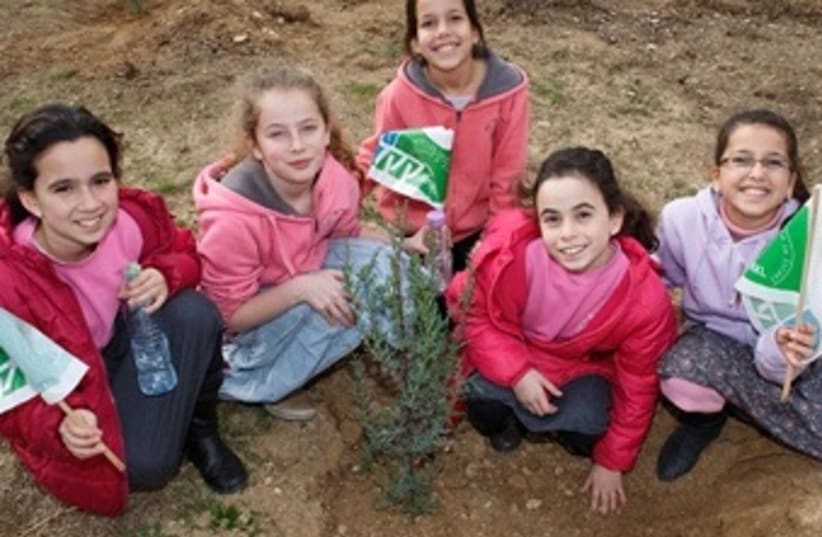An official in the Chinese Embassy revealed this week to The Jerusalem Post a developing collaboration between China and KKL-JNF to improve China’s environment and agricultural productivity.Han Jun, the science and technology counselor for the Chinese embassy in Israel, said Sunday that KKL-JNF and the Chinese People’s Association for Friendship with Foreign Countries (CPAFFC) are advancing an agreement in a memorandum for “bilateral cooperation in the area of agriculture, water, resources, and environmental protection” into an actual “future [Israeli] agricultural technology transfer” to China for “anti-desert, irrigation and forestry.”World chairman of KKL-JNF Efi Stenzler will visit China later this year to meet with government officials, according to Jun. KKL-JNF verified this.
Prior to Stenzler’s visit, Israeli agronomic experts will travel to China to assist in its fight against expanding deserts.In order to address China’s severe desertification problems, Chinese technicians will simultaneously visit Israel to learn more about its modern farming methods.China’s desert currently encompasses 30 percent of its total area and is rapidly increasing with its arable land’s degradation into desert.Jun mentioned that the Chinese government has prioritized confronting its environmental problems of desertification and water shortage.However, he said, “Israeli technology can be a good solution to [China’s problems]” because Israel is a leader in hi-tech, especially in agriculture, and China’s northwestern regions are arid and semi-arid like the Israeli Negev.Jun also indicated that this exchange would be mutually beneficial to Israel because it would showcase Israel’s agricultural technology to the world through the “big Chinese market” Jun’s disclosure follows a series of meetings between KKL-JNF and Chinese representatives that culminated in a Chinese delegation’s tour of Israel this past Thursday, on Tu Bishvat, organized by KKLJNF.President of CPAFFC Li Xiaolin and Chinese Ambassador to Israel Gao Yanping led the contingent that included additional members of CPAFCC and the Chinese embassy.CPAFFC is an organization that engages in diplomatic relations with other countries on behalf of the Chinese government.Included in Thursday’s schedule was the inauguration of the Israel-China Friendship Forest near Lahav, approximately 20 kilometers north of Beersheba.Although the ceremony was more symbolic of continued friendship between the two countries, Chinese delegates and Stenzler alluded to how this partnership between KKLJNF and China will likely transpire in the near future.Li Jing, secretary-general of a subdivision of CPAFFC, said to the Post following the event that China “will learn the innovation and experience [of Israel] and also your advanced technology. I think together with [KKL], we can carry out some mutually beneficial projects with China and Israel.”Jing admitted that she was particularly impressed by the productivity in the Arava Valley in the Negev that she recalled was just desert during her early visits to Israel two decades ago.Jing and the delegation toured the Arava Research and Development Center on its agricultural exhibition “Open Day” before helicoptering to Lahav.Arava coordinator for vegetables Rivka Offenbach said that the agricultural implications of China installing desert farming are enormous.“[China] can grow everything.They can feed all the world,” she said.Offenbach, who invited Yanping and the delegation to “Open Day,” has lectured and taught desert farming in China since the diplomatic door between it and Israel opened in 1993.Offenbach asserted that, with the application of correct techniques, China “can grow everything” because of variations in its arid climates.Although Arava’s produce accounts for 60% of Israel’s agricultural exports, its main crop are peppers, which account for 90% of all this vegetable’s export from Israel.Offenbach said that the Arava Institute manipulates the region’s extreme sunlight and high radiation and its access only to brackish, high salinity water through passive greenhouses and drip irrigation to grow ideal peppers that are high in nutrients like Vitamin C and Sorbic Acid.Similar practices, Offenbach said, can be put in place in China’s dry lands that have high salinity water.Chinese and Israeli agronomists have collaborated since 1993.Offenbach said Israel even imports garlic from China when it is out of season in Israel.But Offenbach pointed out that a KKL-JNF and China partnership can enormously improve its crop yields and that can impact food production not only in China but worldwide.Stenzler also pointed out at the inauguration of the Israel- China Friendship Forest how KKL-JNF’s achievements in desert forestry can alleviate air pollution in China.Stenzler in his speech to the Chinese delegation referred to KKL-JNF as an “international authority on desert and forestation.”Stenzler said, “ we manage to plant forests even in semi-arid regions where trees would usually not be planted.”Stenzler also brought up a 2003 discovery published by the Weizmann Institute that desert forests absorb far more pollutant carbon dioxide than was previously accepted, which he said can not only have direct implications in China, but also South America, Africa and other places.China was estimated in 2012 to have the highest carbon emissions in the world.By planting forests in its deserts, Stenzler suggested China could remove a substantial amount of the greenhouse gas, carbon dioxide from its atmosphere.KKL-JNF’s future exchanges are the next step in communications, which Stenzler said in his address began almost a year and half ago.Stenzler and Yanping met in July to prepare for the Chinese delegation’s most recent visit.However, Jun emphasized that everything in place thus far is just a framework for tangible actions and added “that a lot of things will have to happen in the near future.”China and KKL-JNF partner-up to combat environmental issues
World chairman of KKL-JNF Efi Stenzler will visit China later this year to meet with government officials.
